The band “The Doobie Brothers” (ask your parents) put out an album way back in 1974 with the title, “What were once vices are now habits.”
It is a title that was almost Orwellian in its prescience.
Because truthfully, so much of the things that earlier generations of Americans thought were vices – which can be defined by Webster as “immoral or wicked behavior’’ down to “a weakness of character behavior”- are now simply accepted as hobbies or, as The Doobie Brothers said, “habits.”
I think of that album title every time I hear someone from the Alabama legislature bring back the idea of legalized gambling – which has happened at just about every legislative session since former Governor Don Siegelman’s lottery was voted down by the citizens of Alabama in 1999. Gambling was once considered a vice. Now it’s the answer to problems that don’t even currently exist.
This week, Lt. Governor Will Ainsworth, appearing at an Association of County Commissions of Alabama event, confirmed what most everyone already knew: gambling will be a top priority for lawmakers in the 2022 Regular Legislative Session.
Gambling is one of those “habits’’ that were once considered “vices” because it represented getting rich without having to earn it, and gamblers and those who were looking for the easy score were not thought of as people having “character.”
Still, the fantasy of unearned wealth – or, as another band once sang, “money for nothing” – has been as persistent as hope. Even as we were taught by our parents and in our churches and schools that one makes something of him-or-herself by setting goals and working toward them because that was what developed “character,” we still had that dream of, to quote a 2004 book, “The Lazy Man’s Way to Riches.”
But nobody talks about that aspect of gambling anymore. In conversations with state politicians who ask why people might object to gambling, rarely does anyone utter the phrase, “it’s a moral issue” or “it represents a lack of character.”
So apparently, here we go again. Ainsworth, as reported by Alabama Daily News (ADN), was wishy-washy on whether or not he thought a bill to legalize casino-style gaming would pass in this upcoming session, but said “I do think that will come up.”
Because the people who support gambling are kind of like union organizers in a right-to-work state: no matter how many times they face rejection, they just won’t take ‘no’ for an answer.
Gambling bills are proposed by state legislators with regularity, the most recent during the 2021 legislative session when a bill was passed out of the Senate that would approve a statewide lottery and five casinos - although that number "five" appears to be fluid, increasing to as many as 10 depending on which legislator you are hearing from at any given time.
Gambling bills introduced since 1999 have failed for a variety of reasons, from conservative opposition to the turf wars over which entities could offer casino games or electronic bingo machines.
Earlier, Senate budget committee chairman Greg Albritton spoke of a need to address gambling and the potential tax benefits to the state.
Albritton, the presumptive sponsor of this next gambling bill, said he plans to use Senate Bill 310, which passed during the 2021 regular session, as a starting point. Albritton told ADN, “We can either choose to ignore it, or we can do what the government is supposed to do, and that’s control industries like this so that we can regulate it properly and tax it and benefit from it.”
First of all, show me where Alabama is “supposed” to continue to pursue expanded gambling. The last time the people were allowed to vote on it, gambling lost. But sometimes legislators are like children who complain, “But everyone else is doing it!” and just can’t believe the idea isn’t as popular outside the State House as it apparently is on the inside – and maybe it is, finally.
Secondly, Albritton said that the government’s job is to control these types of industries and regulate, tax, and benefit from them. One problem is, the bill that he is starting from violated free-market principles, favoring the state’s existing gaming operators over others that might want to open up shop in Alabama legally.
Now ask yourself why existing gaming operators should find favor among state legislators rather than open the process up.
As we head into another legislative session, the focus is on ways the state can bring in new tax revenues rather than talk about operating the state within already record revenues or putting money back into the pockets of Alabamians through lower tax rates. Even in the talk of eliminating state tax on groceries, the objection was over the ability to make up for that loss of revenue – ignoring the fact that the state doesn’t need more revenue right now.
The American Psychiatric Association classifies problem gambling as an addiction. The first step in the Gamblers Anonymous Recovery Program is admitting “we were powerless over gambling.”
That sounds a lot like many of our state legislators.
As former Governor Robert Bentley once said, “The issue of gaming in Alabama has been the subject of dispute and controversy for years. In my opinion, it is something that will never die.”
This next legislature will have a hard time proving the state needs gambling in its current economic condition.
But when every state around us appears to be getting rich off gambling, we start to feel like fools for not getting our share.
Ray Melick is Editor-in-Chief of 1819 News. The views and opinions expressed here are those of the author and do not necessarily reflect the policy or position of 1819 News. To comment, please send an email with your name and contact information to Commentary@1819News.com.










